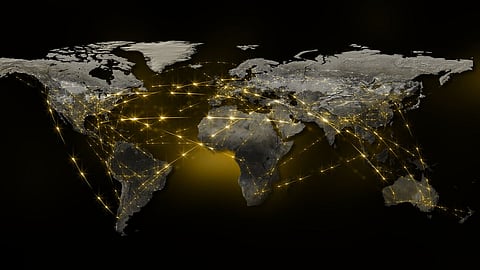
- News
- Women
- Magazine
- IndustryIndustry
- InsightsInsights
- Success Stories
- PublishPublish
- ContactContact
- Media KitMedia Kit

Geopolitical Shifts Reshaping International Trade Strategies
New Delhi [India], July 2: A supply chain manager in Mumbai no longer reads world news for curiosity; every tariff rumour or sanction tweet can upend this week's purchase order run. Geopolitical events have shifted from distant background noise to same-day operational triggers, forcing companies to treat politics as a core supply chain variable every single day.
Flashpoints & Fault Lines Reshaping Commerce
Trade-War Whiplash: The U.S.–China tariff tit-for-tat hiked duties on thousands of SKUs, nudging firms to reroute electronics and apparel orders toward Vietnam, Mexicoand India.
Climate-Linked Controls: Europe’s Carbon Border Adjustment Mechanism ties market access to carbon footprint, turning ESG metrics into cost items.
Supply-Chain Nationalism: The U.S. CHIPS Act, Japan’s strategic reserves, and India’s PLI schemes all pump subsidies into domestic capacity for semiconductors, APIs, and renewables, shrinking the global single-source model.
Pandemic Lessons: COVID-19 exposed the peril of ultralean, far-flung networks when border closures stranded inventory and jolted demand forecasts.
Result: cost minimisation has ceded the driver’s seat to resilience and optionality.
Conflict Zones and Overnight Disruptions
Russia’s 2022 invasion of Ukraine slashed Europe’s gas flows and grain exports almost overnight, igniting a frantic rush for alternative suppliers. In Asia, uncertainty over Taiwan and the South China Sea prompts insurers to reprice maritime risk and shippers to sketch contingency routes. Conversely, new alliances such as the Regional Comprehensive Economic Partnership (RCEP) illustrate how blocs form to offset geopolitical friction, redrawing supply maps in real time.
New Corridors, New Rules
China Plus-One: U.S. import share from China has dipped while Mexico and Vietnam fill the gap.
Energy Pivot: Europe swapped Russian pipelines for LNG berths in the U.S., the Gulf and Qatar.
South-South Surge: China, India, and ASEAN deepen ties with Africa and Latin America, chasing growth insulated from Western sanctions.
Trade geography now follows political alignment and risk calculus more than headline labour costs.
Financial Ripples: From Tariffs to FX Turbulence
Tariffs land as direct line-item cost hikes. Conflicts spike bunker fuel and insurance premiums, while coup rumours or sanctions spark currency swings that shred thin margins. Companies are responding with:
Dynamic hedging against multi-currency exposures.
Shorter contract cycles to re-price freight and materials faster.
Bigger safety stocks on mission-critical parts, cash-heavy but interruption-proof.
The finance function has morphed from back-office clerk to geopolitical risk trader.
Strategy Playbook: Diversify, Friend-Shore, Near-Shore
Winning firms no longer bet big on a single node. They:
1.Spread sourcing across two-plus countries per key component.
2.Friend-shore with politically aligned partners to trim sanction risk.
3.Nearshore finished-goods assembly closer to core markets for speed and brand protection.
Apple shifting some iPhone output to India, European automakers sourcing EV batteries from Morocco, and U.S. retailers booking textile capacity in Central America all follow the same logic: keep the customer close, keep the risk dispersed.
Data as the New Defence System
Geopolitical agility depends on staying ahead of the curve. The Dollar Business EX-IM engine collects real-time data from customs records, shipping updates, market shifts, and even social media buzz, then raises a red flag when something demands your attention.
Whether it’s a sudden 15% duty proposal on steel tubes in Brussels, a drought causing shipping delays at the Panama Canal, or a sanctions bill targeting a key supplier in Shenzhen, you’ll know the moment it matters.
Because the data is live, procurement heads can pivot before disruption becomes damage: they can reroute orders, lock freight, or hedge currencies within hours, not weeks.
Intelligence in Your Pocket
Speed only counts if the right person sees it first. Mobile trade-intelligence apps push instant alerts, tariff filings, and vessel diversions and labour strikes to field teams on the factory floor or stuck in airport security lines. Decisions that once waited for desk time now happen in taxi queues, compressing reaction loops from days to minutes.
Looking Forward: Multipolar, Fast-Moving, Data-Led
The future of trade is a chessboard of blocs: North America, Europe, China, and a rising Global South, each with unique standards, subsidies, and red lines. Competitive advantage will hinge on three capabilities:
1.Forecasting political shifts through AI-enhanced scenario models.
2.Re-routing supply chains at digital speed using twin simulations and pre-negotiated capacity.
3.Executing transactions via smart contracts that release payment the instant a blockchain e-bill of lading confirms delivery.
Organisations that bake geopolitical awareness into everyday operations will thrive. Those treating politics as tomorrow’s problem risk watching margins, market share, and reputation evaporate at the next flashpoint.
About The Dollar Business
Based in India, The Dollar Business parses billions of shipment records across 181+ countries, verifies over 20 million entities, and delivers live geopolitical and trade insights through its EX-IM platform and mobile app. From tariff radar to supplier vetting, it equips exporters and importers to spot risks early, seize new corridors, and build supply chains that bend without breaking.
For more information, please visit the official website at The Dollar Business
Follow us on Google News
